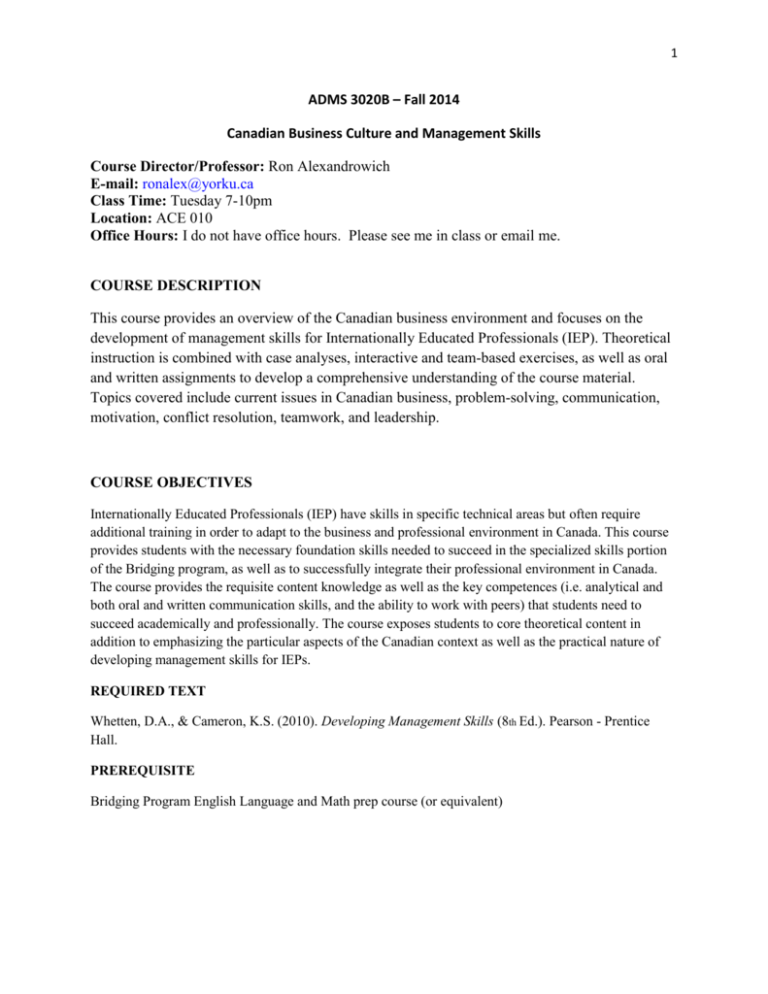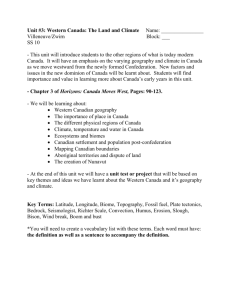
1
ADMS 3020B – Fall 2014
Canadian Business Culture and Management Skills
Course Director/Professor: Ron Alexandrowich
E-mail: ronalex@yorku.ca
Class Time: Tuesday 7-10pm
Location: ACE 010
Office Hours: I do not have office hours. Please see me in class or email me.
COURSE DESCRIPTION
This course provides an overview of the Canadian business environment and focuses on the
development of management skills for Internationally Educated Professionals (IEP). Theoretical
instruction is combined with case analyses, interactive and team-based exercises, as well as oral
and written assignments to develop a comprehensive understanding of the course material.
Topics covered include current issues in Canadian business, problem-solving, communication,
motivation, conflict resolution, teamwork, and leadership.
COURSE OBJECTIVES
Internationally Educated Professionals (IEP) have skills in specific technical areas but often require
additional training in order to adapt to the business and professional environment in Canada. This course
provides students with the necessary foundation skills needed to succeed in the specialized skills portion
of the Bridging program, as well as to successfully integrate their professional environment in Canada.
The course provides the requisite content knowledge as well as the key competences (i.e. analytical and
both oral and written communication skills, and the ability to work with peers) that students need to
succeed academically and professionally. The course exposes students to core theoretical content in
addition to emphasizing the particular aspects of the Canadian context as well as the practical nature of
developing management skills for IEPs.
REQUIRED TEXT
Whetten, D.A., & Cameron, K.S. (2010). Developing Management Skills (8th Ed.). Pearson - Prentice
Hall.
PREREQUISITE
Bridging Program English Language and Math prep course (or equivalent)
2
EVALUATION
1. Midterm Individual Assignment - 25%
2. Group Project and Presentation - 40%
Presentation – 25%
Written Project – 15%
3. Participation in Class Discussions - 15%
4. Final Examination - 20%
Midterm Assignment (25%):
A critical skill for business professionals in all fields is the ability to communicate effectively in
writing on a variety of topics in a cogent and easily understandable way, even by those who may
not be familiar with the topic.
Students will work individually on a written assignment where they will compare and contrast
Canadian management practices with those of an international context that they have experience
with.
Building on the learning from the self-assessments and class discussions, this reflexive writing
exercise can focus on either:
How a specific managerial issue encountered in a foreign country can be informed by
Canadian business practices
How a specific Canadian business issue can be informed by different management
practices from a foreign context
How their management or leadership style has changed since coming to Canada
How the Hofstede or Trompenaars cultural value dimensions can be applied to a different
cultural context they have experience with and how it compares to the Canadian context
The objective is to reflect in a personal manner on how an Internationally Educated Professional
perceives differences in certain management practices and what they can learn from them in
order to improve their management skills.
Students should ideally focus on one of the management skills from the course to compare and
contrast the Canadian cultural context with another country.
3
The paper will be evaluated on the quality of the writing, the analysis and the insight. The
written assignment is limited to six (6) double-spaced pages (12 pt. font and 1.25” margins).
Assignments handed in past their due date will be assessed a penalty of (5%) per day late.
Group Project (40%)
Written Report - 15%
Presentation - 25%
The ability to present complex material in a clear and effective manner is a skill from which you
will benefit greatly. Throughout your career you will likely be required to make presentations,
both individually and as part of a group. For this assignment, students will form groups of at
least four and no more than six members.
Each group will be required to make a 30 minute presentation (20 minutes + 10 minutes for
Q&A) on a consulting project for a real organization on a specific management issue or
problem relevant to the organization.
The project should focus on one of the management skills covered in the course e.g. problem
solving, communication, motivation… The presentation (and accompanying report) should use
the theoretical model(s) from the course to formulate recommendations and derive conclusions
concerning the specific issue. Students may also incorporate insights from their cross-cultural
analysis in the midterm assignment to explain how they might inform the organization’s problem
or potential solutions. Thus, the group is responsible for both the formulation and resolution of a
typical problem in contemporary organizations.
The presentation should cover the background of the organization, the issue, the relevant
model(s) used for analysis, the proposed solution and implementation plan, and a questionand answer period.
The project’s final grade will be derived from instructor evaluation. Each member of the group
must speak an equivalent amount.
Written Report
Your group paper should be 12 - 15 pages, excluding the bibliography (Arial or Times New
Roman, 12 pitch, with 1" margins; double-spaced). Your paper will use the following chapter
guidelines.
Section 1: - Introduce the management issue faced by the organization.
Section 2: Explain why the issue is of importance to the practice of management within the
organization you researched. Identify the major stakeholders within the organization and how
they are affected.
4
Section 3:– Recommendations - Provide your solution(s), tool(s), to resolve these problems.
There are multiple sources of information: the news/press, journals, managers and employees,
your own experiences, academic and non-academic journals. You must include a bibliography of
articles cited, using the APA style. Your paper will be judged on style (grammar, etc.) and
content (the extent and quality of your research, analysis, and recommendations).
Final Examination (20%):
The final exam will take place during the twelfth and final class of the term. It will consist of two
case analysis questions that will require the application of the theoretical principles and
management skills from the course to a specific business case. The exam will be two hours long
and open book. In the case of illness (accompanied by a doctor’s note) or exceptional
extenuating circumstances preventing students from writing the exam at the scheduled date and
time, the instructor and office should be notified immediately.
Class Participation (15%):
As a business professional and manager, you will be required to be an effective and frequent
contributor to group discussions and meetings and class discussions serve as an excellent means
to practice this important skill. In addition, everyone in the class should have the opportunity to
share their thoughts, questions and concerns about to the material or their own experiences.
Regular attendance and participation are important to your successful completion of this course.
You should complete the assigned readings and any assignments prior to each class and should
be prepared to discuss key questions and cases. You are encouraged to prepare for class with
your colleagues to discuss relevant readings and cases. However each member of the class
should be fully conversant in the material and is expected to participate in class.
More specifically, participation grades will be based on students’ ability and willingness to:
Volunteer responses that are both informative and relevant to open questions posed by
the instructor
Interact with and question other students and the instructor in a constructive manner
during class discussions
Provide and substantiate their opinions and comments when called upon by the instructor
STANDARDS OF PERFORMANCE
It is expected that the student will attend every class on time and stay for the entire session. It is
expected that the student will have completed the assigned readings and other preparation prior
to class so that the student can be actively involved in class exercises and discussions.
5
CLASS SCHEDULE
Please note that this schedule is subject to change. In addition to the textbook readings, any
supplementary articles assigned by the instructor will be posted on the web site or handed out in
class.
Date of class
Sept 9
Chapter
Deliverable(s)
Group
Formation
Ch. 1
Self-Awareness
exercise
Managing Stress/Solving
Problems
Analytically and
Creatively
Communication
/Power and
Influence
Coaching
Motivation/
Ch. 2-3
Life Balance
Analysis –p.156
Ch. 4-5
Diagnostic
Survey p.234
Ch. 6
Oct14
Conflict
Resolution
Ch. 7
Class to catch
up on previous
articles and
chapters
Individual
Assignment due
Oct 21
Chapters 8-9
Oct 28
Nov 4
Empowering,
Delegating/Building Teams
Leading Positive Change
Group Presentations
Nov 11
Group Presentations
Nov 18
Nov 25
Review
Final Exam (in class)
Sept 16
Topic
Introduction to course and
requirements.
Icebreakers/Group Formation
Introduction to
Canadian Business
Self-awareness
and Management
Skills
Sept 23
Sept 30
Oct 7
Chapter 10
Group
Presentations
Group
Presentations
Review
Final Exam
Group
Presentations
Group
Presentations
Review
Final Exam






